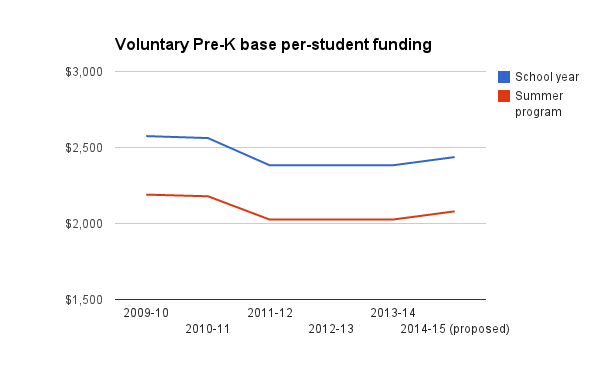In coming days, Florida Gov. Rick Scott is expected to approve a funding boost to one of Florida’s largest and most popular school voucher programs.
Under the legislative spending plan that sits on his desk, the Voluntary Pre-K program would receive a funding boost of about $54 per student for programs offered during the school year. That would be the program’s first increase in six years.
Florida’s pre-K program is recognized as a national leader for giving parents access to schools of their choice. Last year, it enrolled 174,145 students, with about 80 percent of them served by private providers.
The likely funding increase is not everything early-learning advocates may have hoped for. It won’t undo all of the cuts and level funding of recent years. But it’s a sign of the national trend marked earlier this month by the National Institute for Early Education Research, which found states boosted their publicly funded preschool programs by a combined $30.6 million in the previous school year after adjusting for inflation, while funding for Florida’s pre-K program remained flat.
In its latest annual State of Preschool report, the group says the funding increases in other states were “just a small step towards reversing nearly a half a billion dollars in cuts in the previous school year,” but calls them “a step in the right direction.”

The report says despite the increases, “the level of funding provided for pre-K is, in too many instances, inadequate to support good quality, and that effectiveness suffers as a result.” It does give Florida high marks for access, as one of just five states where more than 60 percent of children are participating in the program. Only Washington D.C. claimed a higher proportion of 4-year-olds enrolled.
However, it has drawn criticism in some quarters for focusing more on “inputs” (like funding per student) than on results (how well the providers prepare children for kindergarten).
In a statement responding to the report, Florida’s Office of Early Learning emphasized its focus on the latter. Executive Director Shan Goff noted, “It is difficult, if not impossible, to compare our state’s commitment to funding free prekindergarten for every 4-year-old in the fourth largest state in the nation to a smaller state or district program that serves a portion of its children.” What’s more important, she added, is how that money gets spent.
James Herzog, education director for the Florida Conference of Catholic Bishops, said the funding boost, though small, would provide a “shot in the arm” to pre-K providers – which include more than 100 Catholic schools – and increase their ability to do things like recruit and keep their best teachers.
Beyond simple funding increases, the conference has advocated for lawmakers to take other steps to bolster pre-K, such as “bonus” funding for providers that do the best job preparing children for Kindergarten. That, Herzog said, could help encourage more schools to offer Pre-K, and to ensure their programs are high-quality.
Herzog prepared an analysis that shows Catholic schools are less likely to participate in the pre-K program than the state’s two K-12 scholarship programs. That would be the McKay scholarships for special-needs students, and the Florida Tax Credit Scholarship Program for low-income students, which is administered by organizations like Step Up For Students, which co-hosts this blog.
In the two previous school years, Florida’s Catholic schools have grown their enrollment slightly, and enrolled hundreds of new students using tax credit and McKay scholarships. In those same years, they saw their pre-K enrollment decline.


